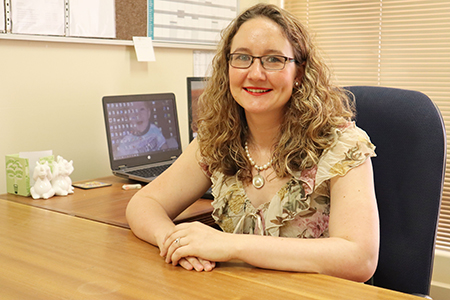Nursing is a career that chooses you, not the other way round. It demands nothing less than passion and selfless, hard work. Fortunately most nurses are an example of this kind of dedication, but research shows that there is an urgent lack of skills development with regard to leadership in this profession.
Her unquestionable commitment towards this field of study has motivated a researcher at the North-West University’s (NWU’s) School of Nursing to address this problem, as she would like to see South African nurses thrive to their fullest potential.
Prof Siedine Coetzee’s love for research recently reached the next level when she was awarded the first research chair in Nursing Science from the National Research Foundation (NRF). For the next five years she can now focus on developing nurses’ leadership skills. Through this chair, the NRF will contribute more than R8 million towards the development of these much-needed skills.
According to Prof Coetzee, through its leadership education, the SANOPSys SARChI-Albertina Sisulu Chair in Nursing Science aims to improve the quality of South African nursing, organisational, patient, and system outcomes and the delivery of effective, safe and people-centred healthcare services.
Research has confirmed that the immediate environment where healthcare professionals practice has the greatest effect on nursing, patient and organisational outcomes.
“The huge lack in leadership skills and in leaders places a major constraint on the nursing profession in South Africa where nurses, who make up the majority of the healthcare professionals, have little or no voice – not in practice and not in policy-making,” says Prof Coetzee.
“Research shows that in the practice environment of nurses, leadership has the greatest impact on the nurse with regard to job and career satisfaction, intention to leave, burnout, patient safety and quality of care, patient satisfaction and organisational culture. One such an example was seen at a clinic where the lack of sufficient staff and resources was clearly visible. However, effective leadership was evident. Despite these crucial shortcomings, the nursing staff flourished.”
According to her the pursuit of quality healthcare for all South Africans is highly complex. It depends on an intricate balance between the quadruple aim of healthcare, namely to:
• Improve the patient’s experience of care (patient)
• Reduce the per capita cost of healthcare (organisation)
• Improve the health of populations (systems)
• Improve the wellbeing of nurses and multidisciplinary team members (nurses)
The research chair aims to take the lead in nursing science by empowering current nurses in management and leadership positions, and identifying and capacitating future leaders in nursing across all sectors, hospitals and disciplines of nursing science in South Africa.
“The aim of our research is to develop a South African Institute of Excellence (IoE) in scholarship and training relating to leadership and governance in nursing science,” Prof Coetzee says.
The chair’s objectives include the collection of a national database of nurses’ experiences in order to develop interventions, strategies and policies to improve nursing outcomes, the qualifications of nurses, and the recruitment and retention of nurses. A first ever national database of patient safety and satisfaction is planned. Data from these objectives will also be used to develop prediction models that can be used to assist with the planning of nurse staffing ratios, skills mixes, and the distribution and allocation of human resources in healthcare facilities.
“The outcomes of the above-mentioned research will subsequently be used to develop short courses for training material to be used by managers and organisations all over South Africa, possibly even in SADC countries,” Prof Coetzee says.
The SANOPSys SARChI-Abertina Sisulu Chair in Nursing Science will consist of a core team and a network of collaborators in the NWU, as well as from other South African, regional and international institutions.
According to Prof Coetzee, their work – to improve the practice environment of nurses – will be launched in January 2020. “When we develop healthy and happy nurses, we will have healthier and happier patients,” she concludes.

Siedine Coetzee.
